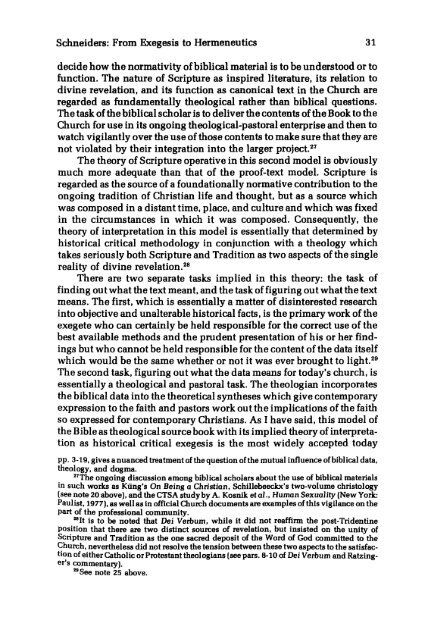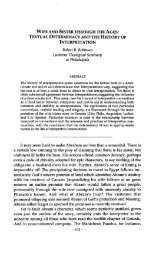FROM EXEGESIS TO HERMENEUTICS - Rice School of Pastoral ...
FROM EXEGESIS TO HERMENEUTICS - Rice School of Pastoral ...
FROM EXEGESIS TO HERMENEUTICS - Rice School of Pastoral ...
You also want an ePaper? Increase the reach of your titles
YUMPU automatically turns print PDFs into web optimized ePapers that Google loves.
Schneiders: From Exegesis to Hermeneutics 31decide how the normativity <strong>of</strong> biblical material is to be understood or t<strong>of</strong>unction. The nature <strong>of</strong> Scripture as inspired literature, its relation todivine revelation, and its function as canonical text in the Church areregarded as fundamentally theological rather than biblical questions.The task <strong>of</strong> the biblical scholar is to deliver the contents <strong>of</strong> the Book to theChurch for use in its ongoing theological-pastoral enterprise and then towatch vigilantly over the use <strong>of</strong> those contents to make sure that they arenot violated by their integration into the larger project. 27The theory <strong>of</strong> Scripture operative in this second model is obviouslymuch more adequate than that <strong>of</strong> the pro<strong>of</strong>-text model. Scripture isregarded as the source <strong>of</strong> a foundationally normative contribution to theongoing tradition <strong>of</strong> Christian life and thought, but as a source whichwas composed in a distant time, place, and culture and which was fixedin the circumstances in which it was composed. Consequently, thetheory <strong>of</strong> interpretation in this model is essentially that determined byhistorical critical methodology in conjunction with a theology whichtakes seriously both Scripture and Tradition as two aspects <strong>of</strong> the singlereality <strong>of</strong> divine revelation. 28There are two separate tasks implied in this theory: the task <strong>of</strong>finding out what the text meant, and the task <strong>of</strong> figuring out what the textmeans. The first, which is essentially a matter <strong>of</strong> disinterested researchinto objective and unalterable historical facts, is the primary work <strong>of</strong> theexegete who can certainly be held responsible for the correct use <strong>of</strong> thebest available methods and the prudent presentation <strong>of</strong> his or her findingsbut who cannot be held responsible for the content <strong>of</strong> the data itselfwhich would be the same whether or not it was ever brought to light. 29The second task, figuring out what the data means for today's church, isessentially a theological and pastoral task. The theologian incorporatesthe biblical data into the theoretical syntheses which give contemporaryexpression to the faith and pastors work out the implications <strong>of</strong> the faithso expressed for contemporary Christians. As I have said, this model <strong>of</strong>the Bible as theological source book with its implied theory <strong>of</strong> interpretationas historical critical exegesis is the most widely accepted todaypp. 3-19, gives a nuanced treatment <strong>of</strong> the question <strong>of</strong> the mutual influence <strong>of</strong> biblical data,theology, and dogma.27 The ongoing discussion among biblical scholars about the use <strong>of</strong> biblical materialsin such works as Küng's On Being α Christian, Schillebeeckx's two-volume christology(see note 20 above), and the CTSA study by A. Kosnik et al., Human Sexuality (New York:Paulist, 1977), as well as in <strong>of</strong>ficial Church documents are examples <strong>of</strong> this vigilance on thepart <strong>of</strong> the pr<strong>of</strong>essional community.28It is to be noted that Dei Verbum, while it did not reaffirm the post-Tridentineposition that there are two distinct sources <strong>of</strong> revelation, but insisted on the unity <strong>of</strong>Scripture and Tradition as the one sacred deposit <strong>of</strong> the Word <strong>of</strong> God committed to theChurch, nevertheless did not resolve the tension between these two aspects to the satisfaction<strong>of</strong> either Catholic or Protestant theologians (see pars. 8-10 <strong>of</strong> Dei Verbum and Ratzinger'scommentary).29See note 25 above.



